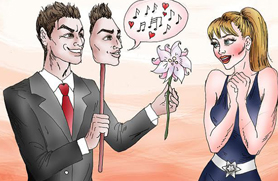This is an example of psychopathic personality disorder. Unlike other psychological disorders, this is not openly noticed by the people. But every personality disorder has its prominent traits. On observing which we could definitely save ourselves from falling prey to such people.
He was definitely of a different kind. The initial meetings with him just clicked so well! The insecure, timid girl was slowly getting out of her shell. She often liked expressing before him with no worries of being judged. All her flaws were turned into her strengths, all her insecurities were now left behind. She started concentrating more on how she looked these days. Even the extra flab on her looked adorable because he said so. It was definitely a blissful period of her life. This was a kind of perfect happiness she had never experienced before. He was simply like her hence she never had to attempt to fake her identity as he was madly in love with the real her and had gladly accepted her the way she was. She had undoubtedly thought of him as her Prince charming.

Do you remember reading that book? Yes my favourite one. The author of that book happened to see me while on the walk and was amazed to watch how well I have trained my dog in performing tricks. She has invited me for coffee at her place.
Eh, what is this you are wearing? This dress doesn’t suit short girls like you. Don’t you think you have put on loud make up? You look like an overly decorated old truck. He laughs aloud. She too dismisses it thinking of it as a joke.
Who was that person who smiled at you on the street? Don’t you think pathetic looking people often stare at you? I mean, you aren’t even pretty. Just think why else would anyone stare at you? It’s pathetic. I feel ashamed to walk with you. She felt terrible but felt there was something terribly wrong with her. These days he had started criticizing almost everything about her. He was playing a detective too. He often asked too many questions. Well, she thought, a person who loves her so much will definitely be possessive about her. A sharp slap on her face reminds her that sometimes he is a too possessive or whatever you call it. So what? He loves her!
She wished to give it back to him and question him about his sudden change but couldn’t as he was so sick. He had migrane of a terrible kind. How could she disturb his health by her mean sounding talks? She let it go and saw to it that his health is restored. After all he was her main priority. Tring tring, “Hello Riya! Yeah hmmm .. Okay. Yes of course I am coming. It will be great fun”. With no further talks he leaves. She is left wondering the reason behind this sudden wellness. He was often sick. He said he had survived cancer. How could she question? All that she ever wished was his good health which were the rare times. But this was not the first time he had suddenly hopped out after being terribly sick. He was just like that.
She felt pity on him as she knew from him about his bad childhood, and even later on in his life , how he was badly used by everyone for that selfish purposes and that was the reason he didn’t trust her and often expected her to report about everything that she does. But this is just the way he was. So what? He loves her.
Gradually things started going out of her control. The criticizing got worst and he no more found her interesting and he was no more head over heels on her. He was more strict regarding her failure to report every minute detail of her life. He started talking more about the other women in his life and how much they desire to be with him and what a blunder he had done choosing her over them. She felt there was something seriously wrong with her and blamed herself for this situation.
She often sensed a heap of lies he said, yet daring to doubt on him was next to committing a sin second to murder.
One fine day, when he got extremely insane and blamed her for the mistakes she had never done and after being put down several times, she decided this was it. She asked him to split up! The very next moment he was at her feet begging not to leave. He convinced her in most charming way. She was finally convinced. It wasn’t that hard task for him.
After a couple of days her prince charming was back to being a jerk. And the cycle continues . . .
They don’t really have a firm personality, hence they mirror the personality of others. They are just like you. They unnecessarily lie a lot without feeling guilty. They are extremely charming and magnetic. They could sweep you off your feet! They flatter a lot. They seek lot of attention, gather sympathy, they construct stories on health issues with no proper foundation, they indulge in self-praise and talk about how much bothers love them. They keep looking for new targets. They devalue the persons they initially seemed to love like nobody else. They could get violent and could simply throw them from cloud nine as if they never meant anything to them. They lack sympathy and treat others like objects and manipulate them easily. They don’t let others get over them. And seek sympathy and act apologetic. Once their targets get convinced, they are back with their mind games.

Arpita Chipkar from karwar is a student of B A in Journalism at St. Aloysius College, Mangalore







Comments
I do not even know how I ended up here, but I thought this post was great.
I do not know who you are but certainly you're going to a famous blogger if you
are not already ;) Cheers!
My web site: how to get rid of hives natural: http://www.hghsjf.com/comment/html/index.php?page=1&id=35436
Add new comment